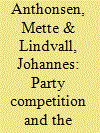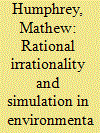| Srl | Item |
| 1 |
ID:
087689


|
|
|
|
|
| Publication |
2009.
|
| Summary/Abstract |
This article makes a case for rethinking traditional approaches to the study of legislative behaviour on behalf of women by asking (1) not when women make a difference, but how the substantive representation of women occurs; and (2) not what 'women' do, but what specific actors do. The first shift aims to explore the contexts, identities and attitudes that motivate and inform substantive representation. The second seeks to move beyond a focus on female legislators to identify the 'critical actors', male and female, who may attempt to represent women as a group. In so doing, this framework calls attention to how structure and agency interact in the substantive representation of women.
|
|
|
|
|
|
|
|
|
|
|
|
|
|
|
|
| 2 |
ID:
087691


|
|
|
|
|
| Publication |
2009.
|
| Summary/Abstract |
This article argues that after the Golden Age of capitalism, corporatist methods of policy-making have come to depend on specific modes of party competition. In contrast to previous studies of corporatism, which have argued that corporatism depends on strong social democratic parties, this article suggests that the competition between well-defined left-wing and right-wing 'blocs' has become detrimental to corporatism. In countries with mixed governments or traditions of power-sharing, on the other hand, corporatism thrives. These conclusions are based on a comparison of four traditionally corporatist countries - Denmark, the Netherlands, Sweden and Switzerland - from the early 1970s to the late 1990s.
|
|
|
|
|
|
|
|
|
|
|
|
|
|
|
|
| 3 |
ID:
087692


|
|
|
|
|
| Publication |
2009.
|
| Summary/Abstract |
This article analyses the party-system reforms introduced in Russia during Vladimir Putin's presidency. It contests Byron Moraski's interpretation, published in an earlier edition of this journal, which claims that the reforms introduced in Putin's second term were a response to the 2003 Duma election and were intended to preserve the unity and discipline of United Russia, the regime's 'party of power'. This article argues that Moraski's explanation of the second-term reforms is flawed and contends that the first- and second-term reforms were part of a wider reform programme designed to centralize Russia's political system, consolidate its party system and contribute to the construction of a façade democracy. The article also challenges Moraski's argument that these reforms, while introduced to advance the regime's interests, could further democratization in the longer term by adding the crucial caveat that stronger opposition parties that could act as a democratizing influence will only emerge if practices of electoral manipulation lessen or fail.
|
|
|
|
|
|
|
|
|
|
|
|
|
|
|
|
| 4 |
ID:
087690


|
|
|
|
|
| Publication |
2009.
|
| Summary/Abstract |
Do western publics make 'demands' for environmental policy that they have no desire to see enacted? The thesis that they do has been put forward recently by advocates of the 'post-ecologist' paradigm such as Ingolfur Blühdorn. Taking the example of climate change, this article assesses survey results that provide indicative evidence that such 'simulative' demands may exist. I suggest that such demands are, however, best explained through conceptual tools available from game-theoretic and rational-actor models of political behaviour, in particular rational ignorance and rational irrationality, rather than with the societal-level accounts preferred by Bluhdorn and others.
|
|
|
|
|
|
|
|
|
|
|
|
|
|
|
|
| 5 |
ID:
087693


|
|
|
|
|
| Publication |
2009.
|
| Summary/Abstract |
Wilson begins his critique by questioning the argument that United Russia's (UR) deputies elected under proportional representation (PR) will be less likely to violate party discipline than the party's single-member district (SMD) deputies. He states that United Russia's deputies 'are not any more beholden to party leaders under a closed-list PR system than they were under the mixed system' because the centralized nature of United Russia allowed 'the party leaders (or more accurately, the presidential administration)' to remove disloyal deputies from the party ticket.3 In other words, he argues that control over list placement is a lesser means for controlling party deputies. He then goes on to provide an example of how a list deputy was expelled from the party for requesting that the Constitutional Court protect UR deputies from pressure from the presidential administration.
|
|
|
|
|
|
|
|
|
|
|
|
|
|
|
|